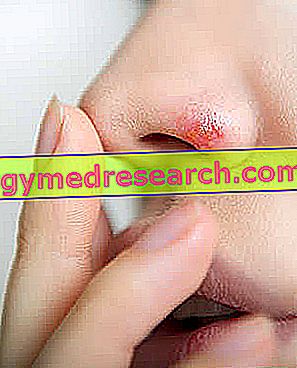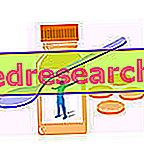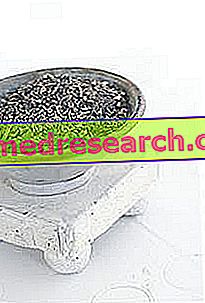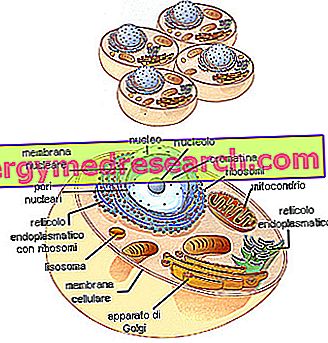Nasal herpes is a disease of infectious origin caused by the Herpes simplex type 1 virus, the same responsible for herpes labialis and sometimes the genital herpes.

The symptoms that warn of the appearance of nasal herpes are: itching, heat, tension and swelling, located in the area where the vesicles will soon appear.
Nasal herpes is a chronic disease and remains latent until acute. The infectious agent, in fact, cannot be eradicated and reappears, multiplying, when natural defenses are compromised (eg due to mental stress, general physical and localized).
Nasal herpes often accompanies the labial herpes; more rarely to ocular herpes.
What to do
To avoid nasal herpes it is necessary to intervene on two fronts:
- Prevent infection.
- Nasal herpes is contracted mainly by direct passage. The viruses are diluted in the serous fluid of the bladders and expand at the time of rupture. It is absolutely necessary to avoid direct contact with carriers of nasal herpes during acute phase.
- According to statistics, the cases of transmission when the disease is latent would be more rare. However, most carriers say they have had no contact with people suffering from acute nasal herpes. This means that carriers must be able to recognize the onset of symptoms early and terminate physical contact early.
- We should avoid exchanging some personal items such as: towels, soaps, handkerchiefs, razors, toothbrushes, depilatories, etc.
- It cannot be excluded that the susceptibility to herpes viruses is genetically determined. In this case, prevention is independent of environmental and behavioral factors.
- In the event of infection, the only (temporary) remedy is to try to prevent acute and treat the symptoms early:
- If possible, reduce periods of excessive psychological stress (work, family, etc.).
- Reduce the frequency of other systemic or local infections (eg influenza).
- Reduce chemical and physical stress (sunburn, abrasion, etc.)
- Adopt a balanced nutrition.
- Carefully treat the contribution of molecules and mineral salts that support the immune system: vitamin C, vitamin D, magnesium, iron, zinc and selenium.
- Promote the intake of antioxidant molecules (of any kind): in addition to vitamin C, also vitamin A, vitamin E, polyphenols, etc. These nutrients and nutritional elements hinder free radicals and improve the general oxidative condition.
- Guarantee the supply of omega 3 essential fatty acids: they have an anti-inflammatory function and stimulate the production of antibodies.
- Make use of probiotic and prebiotic foods: the intestinal bacterial flora participates in the trophism of the immune system, which is why it is necessary that it remain numerous and balanced.
- Ensure the supply of amino acid lysine which appears to have a preventive effect on the infection (even if the reasons are not known).
- Practicing sports with constancy and reasonableness: moderate and constant levels of physical activity improve the immune defenses and the efficiency of the organism. On the contrary, an excess tends to weaken the body (excess means extreme conditions, the same ones that trigger overtraining).
- Take your medication only after consulting your doctor, especially those who require a doctor's prescription (sometimes in surplus from past therapies).
- Prevent cracks due to cold, sun burns and any abrasion or other irritation.
- Use topical medications (ointments and creams) at the very first symptoms.
What NOT to do
Certain behaviors such as:
- Get in direct physical contact with the vesicles of a sick person (although herpes has affected the lips, eyes, genitals, etc.).
- Ignore the first symptoms of nasal herpes and do not warn people that they could come into direct contact with the affected area.
- Use the personal objects of others, especially knowing that they suffer from nasal herpes.
- Neglecting hygiene, especially in activities in close contact with other people (health or public workers, etc.).
The factors that increase the possibility of relapse of nasal herpes are:
- Periods of excessive mental stress: even if limited, they compromise the immune system and allow the onset of nasal herpes.
- Neglecting infections: however harmless, they create an ideal situation for the exacerbation of latent pathologies.
- Do not cure the maintenance of the trophism of the immune system, due to:
- Specific vitamin and saline deficiency of the elements directly involved in the immune synthesis.
- Lack of antioxidants, not only vitamins and salts, but also polyphenols.
- Presence of allergenic foods or those responsible for food intolerance. They tend to increase inflammation levels and promote oxidative stress.
- Diet lacking in prebiotics and probiotics which normally promote the maintenance of the immune system.
- Make use of arginine-based food supplements; the reason is not clear but some studies suggest that this amino acid may favor the onset of acute nasal herpes.
- Ignore recovery times and physical debilitation of incorrectly planned training programs.
- Abuse antibiotics and other drugs.
- Do not protect the nose skin; in particular from winter cold and UV rays (in the warmer months).
What to eat
There is no food remedy against nasal herpes; however, it may be useful to treat various nutritional aspects that directly and indirectly affect the effectiveness and efficiency of the immune system:
- Vitamin C or ascorbic acid: peppers, citrus fruits, parsley, kiwi, lettuce etc. Fresh and possibly raw.
- Vitamin D or calciferol: fish, fish oil and egg yolk.
- Zinc: liver, meat, milk and derivatives, some bivalve molluscs (especially oysters).
- Selenium: meat, fishery products, egg yolk, milk and dairy products, fortified foods (potatoes, etc.).
- Magnesium: oilseeds, cocoa and dark chocolate, bran, vegetables and fruits.
- Iron: meat, fish products and egg yolk. Some vegetables contain it but in a little bioavailable form.
- Polyphenolic antioxidants: fresh and raw fruit and vegetables, red wine, oily and starchy seeds, spices, tea, roots, medicinal herbs etc.
- Lysine: meat, cheese, some fishery products and legumes (in particular soy).
- Probiotics: fermented foods such as yogurt, tofu, tempeh, buttermilk etc. Prebiotics, on the other hand, are molecules of plant origin belonging to the group of carbohydrates (available and not available to humans, fibers).
- Omega 3: fish (especially blue and fat), some oily seeds and related oils (flax, kiwi, grape seeds, etc.), algae.
What NOT to Eat
Improper eating habits such as:
- Monothematic diets.
- DIY vegan diet
- Diet free of vegetables and vegetables.
- Diets based solely on:
- Cooked foods.
- Preserved foods.
- Arginine food supplements.
Natural Cures and Remedies
Some products are able to act positively on the immune system or counteract the infection; however, real remedies are not considered:
- Echinacea and other immunostimulating plants.
- Royal jelly
- Propolis (for oral and topical use).
Pharmacological care
There are no pharmacological remedies that cure nasal herpes by permanently eliminating viruses; are considered a temporary solution.
The therapies are palliative and used to:
- Reduce symptoms.
- Block viral proliferation.
- Facilitate healing.
Specifically, they are mainly used:
- Aciclovir (or similar) in topical cream or tablets for oral use: reduces the replicative capacity of viruses.
- Zinc and / or heparin in cream for topical use: it reduces the time of the rash.
- Interferon: powerful antiviral action.
- Immunostimulants: especially natural or synthetic thymic hormones.
- Antihistamines: against itching.
Prevention
We have already specified that the most effective remedy for nasal herpes is prevention, which is divided into:
- Prevention of contagion:
- It requires attention from those who fear to contract the virus, which must comply with the constraints of physical contact and hygiene in times of potential contagion.
- It requires commitment from those affected by the disease, who must respect a higher level of hygiene and keep away from healthy people, especially children.
- Prevention of acute:
- Keeping general stress low.
- Ensuring the functioning of the immune system (including nutritional status).
- Avoiding getting sick repeatedly or damaging the affected part (nose or mucous membranes).
Medical treatments
To date, no definitive remedies against the Herpes simplex virus are known. This means that nasal herpes cannot be cured.
Each treatment is aimed at decreasing the symptoms in case of acute.
In addition to the prevention of infection, the prevention of manifestations and possibly the use of drugs, no other effective remedies against nasal herpes are known.



